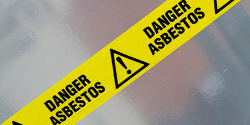

An asbestos expert has been fined after workers under his supervision were exposed to potentially deadly fibres at a college in Greater Manchester.
Trafford Magistrates’ Court sentenced Steven Kelly on 11 October, after three men were spotted without suitable protective clothing in an area of Trafford College in Stretford where asbestos was being removed.
Manchester-based firm Winsulate had been hired to carry out asbestos removal work during a refurbishment project at the college, where Kelly was the supervisor.
He ignored the company’s procedures on working with asbestos, which led to the men being put at risk of breathing in asbestos fibres, and other fibres could have remained on their clothes when they went home to their families in the evening.
Inspectors discovered Kelly had sent the men into the undercroft beneath the classrooms, which had been sealed off from the rest of the building, to fix the temporary lighting while on an unannounced visit to the college during the evening on 12 December 2012.
The men were wearing their own clothes instead of disposable clothing under their overalls, and half masks instead of full-face respiratory masks. They were also wearing lace-up instead of Wellington boots, which meant asbestos fibres could stick to their laces or get inside their boots.
Kelly is a fully-trained and qualified supervisor in licensed asbestos removal but, despite this, several other issues were also discovered on the site.
These included insufficient water for workers to properly sponge down boots and masks to stop fibres becoming airborne, used clothing discarded inside the enclosure, and a failure to carry out daily checks on masks.
Kelly, of Burwell Close in Kirkby, was fined £790 and ordered to pay costs of £250 after pleading guilty to a breach of the Health and Safety at Work etc Act 1974 by failing to take reasonable care of workers under his supervision.
HSE inspector Laura Moran said: “Asbestos is responsible for thousands of deaths in the UK every year but it only becomes dangerous when it is broken up and fibres are released into the air. That’s why asbestos can only be removed by specialist contractors but, as the site supervisor, Steven Kelly put workers at risk by not following the correct safety procedures.
“He simply should never have allowed three men to go into a contaminated area while wearing their own clothes, and without the correct protective clothing and respiratory masks. Workers, their families and anyone else who came into contact with them would have been put at risk as a result of Kelly allowing the men to wear lace-up boots and the clothes they intended to go home in.
“Thankfully, we were able to stop the work and make sure the clothes were disposed of as contaminated waste.”
Around 4,000 people die every year as a result of breathing in asbestos fibres, making it the biggest single cause of work-related deaths in the UK. Airborne fibres can become lodged in the lungs or digestive tract, and can lead to lung cancer or other diseases, but symptoms may not appear for several decades.
If you'd like to keep up-to-date with the latest developments in the heating and plumbing industry, why not subscribe to our weekly newsletters? Just click the button below and you can ensure all the latest industry news and new product information lands in your inbox every week.